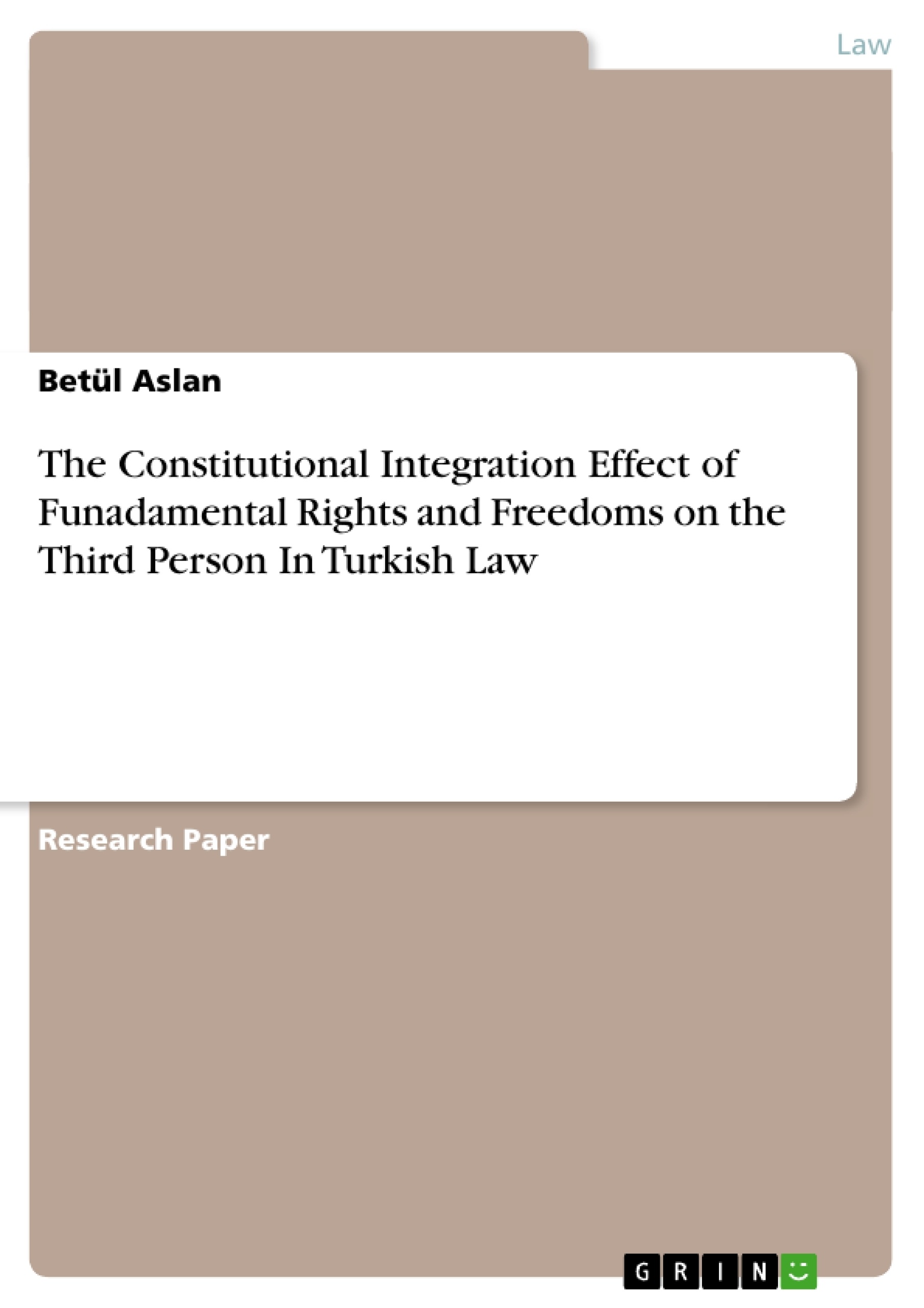The constitutional integration in Turkish law is made by the constitutional harmony among all legal norms. The first stage of constitutional integration is the constitutional harmony among constitutional values. Then, the rank of legal norms is ordered in the light of the first stage. Otherwise, the view of the constitutional integration is concreted by the effect of fundamental rights and freedoms on the third person.
This research aims the composition of Turkish law and German law for the new solutions on constitutional integration effect of fundamental rights and freedoms on the third person in Turkish law.
Inhaltsverzeichnis (Table of Contents)
- I - THE CONSTITUTIONAL INTEGRATION OF LEGAL NORMS
- A-DEFINITION
- B - TYPES
- II - THE EFFECT OF FUNDAMENTAL RIGHTS AND FREEDOMS ON THE THIRD PERSON (DRITTWIRKUNG)
- A-DEFINITION
- B - THE DIMENSIONS OF THE IMPACT OF FUNDAMENTAL RIGHTS AND FREEDOMS
- C - THE APPEARANCE OF THE IMPACT OF FUNDAMENTAL RIGHTS AND FREEDOMS
Zielsetzung und Themenschwerpunkte (Objectives and Key Themes)
This text aims to examine the concept of constitutional integration in Turkish law, specifically focusing on how fundamental rights and freedoms affect third parties (Drittwirkung). The analysis delves into the definition and types of constitutional integration, exploring its practical applications within the legal system.
- The concept of constitutional integration in Turkish law
- The impact of fundamental rights and freedoms on third parties (Drittwirkung)
- The different types of constitutional integration: internal constitutional norms and external constitutional norms
- The role of constitutional integration in achieving legal harmony and protecting constitutional values
- The hierarchy of legal norms and the binding character of law in the context of constitutional integration
Zusammenfassung der Kapitel (Chapter Summaries)
The first chapter, "I - THE CONSTITUTIONAL INTEGRATION OF LEGAL NORMS," introduces the concept of constitutional integration, defining it as a process of legal harmony where all legal rules are aligned with constitutional norms. The chapter explains two key tools of constitutional integration: the tool of statement, which involves providing a constitutional explanation of legal rules, and the tool of completion, which addresses legal deficiencies against constitutional rules.
The second chapter, "II - THE EFFECT OF FUNDAMENTAL RIGHTS AND FREEDOMS ON THE THIRD PERSON (DRITTWIRKUNG)," delves into the concept of Drittwirkung, examining how fundamental rights and freedoms impact third parties. It explores different dimensions of this impact, including the appearance and application of these rights in legal practice.
Schlüsselwörter (Keywords)
The main keywords and focus topics of this text include: constitutional integration, Turkish law, fundamental rights and freedoms, Drittwirkung, legal harmony, hierarchy of norms, binding character of law, constitutional values, legal theory, legal practice, and constitutional order.
Frequently Asked Questions
What is constitutional integration in Turkish law?
Constitutional integration refers to the process of ensuring harmony among all legal norms within the legal system, aligning them with constitutional values and rules.
What does "Drittwirkung" mean?
"Drittwirkung" is the legal concept describing the effect of fundamental rights and freedoms on third parties (private individuals), rather than just the relationship between the state and the citizen.
How is legal harmony achieved in this context?
It is achieved through two main tools: the tool of statement (constitutional explanation of rules) and the tool of completion (addressing legal gaps in accordance with constitutional principles).
Why is German law compared to Turkish law in this research?
The comparison aims to find new solutions for constitutional integration in Turkey, as German legal theory has a long tradition of discussing the horizontal effect of fundamental rights.
What are internal and external constitutional norms?
Internal norms refer to the harmony within the constitution itself, while external norms refer to the alignment of secondary laws and regulations with the constitutional order.
- Citar trabajo
- Betül Aslan (Autor), 2013, The Constitutional Integration Effect of Funadamental Rights and Freedoms on the Third Person In Turkish Law, Múnich, GRIN Verlag, https://www.grin.com/document/209232



